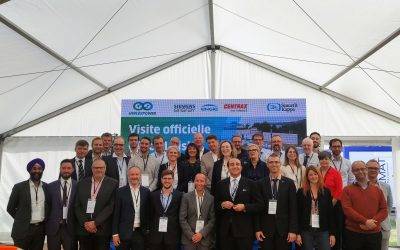ARTTIC warns against hesitant exhaustion of the research allowance
The research landscape in Germany can do more – if it uses the tax research allowance.
The Research Allowance Act ( FzulG ) – according to the conviction of ARTTIC Innovation GmbH one of the most convincing legal measures to strengthen Germany as a research location – is still underutilized by companies. ARTTIC Innovation has identified three of the reasons why researching companies do not apply for research grants:
1. Incorrect assessment of the definition of research and innovation,
2. Incorrect weighing of effort and success rate for the application and
3. Misunderstandings regarding the tax refund, which is also paid out in years of loss.
The Research Allowance Act is aimed at all companies that conduct research or strengthen Germany as a business location with their innovative products. However, companies are often hesitant to apply for the research grant. “We experience that companies are not so convinced of their products that they also apply for the research grant,” explains Anne Baumgärtel, Team Lead Germany at ARTTIC Innovation. “Many people associate the terms research and innovation with basic research, universities and startups. It is often wrongly assumed that you have to be the first on the market with a completely new product. Small and medium-sized enterprises in particular are called upon to present significant improvements in technology or processes so that the effects of the new law really lead to an increase in research and development activities in Germany. “
Baumgärtel continues: “We also observe that entrepreneurs do not apply for funding for their projects because they are of the opinion that the expenditure for the application exceeds the amount of the approved funds. Here it is important to understand that tax incentives are different from the classic allocation of funds. ” The often extensive documents for applying for funding from public funds are not required for applying for the research grant. It is a tight application with few questions, without a lot of administration, technical details or reporting requirements.
The Research Allowance Act, which came into force on January 1st 2020, is associated with a legal claim. Thus the allowance is not subject to the “goodwill” of a decision-making body. According to paragraph 1 of the law, the legal claim arises as soon as the conditions are met. These are described quite simply in Section 6: The certification body must confirm the research project.
Once certified, this permit is valid for several years until the end of the project. Because of this legal claim, the certificate, on which everything ultimately depends, cannot be withdrawn afterwards. Only the information provided by the company on the actual personnel expenses and, if applicable, the contract research costs, which are reported annually to the tax office, determine the amount of the tax credit.
Some researchers also succumb to a misunderstanding regarding the research allowance and the tax reimbursement of expenses: “We observe that startups in particular do not apply for tax reimbursement because they are not yet profitable. However, the mechanism is a tax refund, even in years of loss! Often there is a confusion with depreciation, which reduces a tax burden. In this case, however, the allowance is paid or offset directly as a tax refund and therefore has no influence on loss carryforwards or other aspects. Obviously, companies are giving away the reimbursement they are entitled to, which is based solely on the amount of the expenses, not the amount of taxes. “
The Research allowance calculator ARTTIC provides initial information on how high the research allowance can be.
Why the carousel of amendments to the R&D tax credit law continues to turn
The R&D tax credits in 2024The year 2024 has proven to be decisive for the German R&D tax credits. Following the most recent amendment as part of the Growth Opportunities Act in March, the Federal Government realized during the budget consultations for 2025...
Register Now: In Conversation with EBiSC2
Unlocking the Potential of Stem Cells: Discover the EBiSC Journey to SustainabilityJoin the conversation on the initiative that’s shaping the future of biomedical research! On May 15, 2024, from 14:15 to 15:00 CEST (Europe/Brussels time), the Innovative Health...
The R&D tax credit with a blind eye to earnings –
Why loss-making companies (wrongly) hesitate
Recapitulation The German R&D tax credit has become much more popular in recent years after a modest response following the introduction of the instrument. This can be seen not only in advertising and studies by various associations, but also in the bare figures...
Junior Funding Consultant (m/f/d)
We offer you the unique opportunity to become part of a successful & young team in the attractive growth market for tax-incentivised research funding (R&D tax credits). We are looking for Junior Funding Consultants with a passion for innovation, scientific...
First successful demonstration with 100% green H2
HYFLEXPOWER celebrates successful operation of a gas turbine with 100% green H2On October 12, 2023, at a public event hosted at the HYFLEXPOWER demonstrator site in Saillat-sur-Vienne, France, the HYFLEXPOWER consortium unveiled a ground-breaking achievement - the...
New Security Project AGILE Will Improve Disaster Risk Management
New international security project to improve disaster risk management for unexpected eventsThe international security project AGILE will kick start today. The project is to develop novel tools and methodologies for understanding, anticipating, and managing High...
SYNERGISE for Improved Disaster Management
Internationally Funded Project to Develop an Integrated Toolkit for Improved Management of Natural and Man-Made Disasters Kicks-Off TodayTo boost the efficiency and safety of first responders during life-saving missions, the SYNERGISE team will develop a Novel...
Junior Innovation Consultant (m/f/d)
We offer you the unique opportunity to become part of a dynamic team in the attractive field of innovation and research. We are looking for Innovation Consultants with a passion for innovation, scientific writing and project management. This position is for recent...
Senior Innovation Consultant (m/f/d)
We offer you the unique opportunity to become part of a dynamic team in the attractive field of innovation and research. We are looking for specialists with a passion for innovation, scientific writing and project management. This position is for experienced...
Business Developer (m/f/d)
We are looking for specialists in business development with a strong sales talent and an interest in innovation, research and science. This position is for recent graduates or experienced professionals and involves assisting clients from a variety of industries with...









